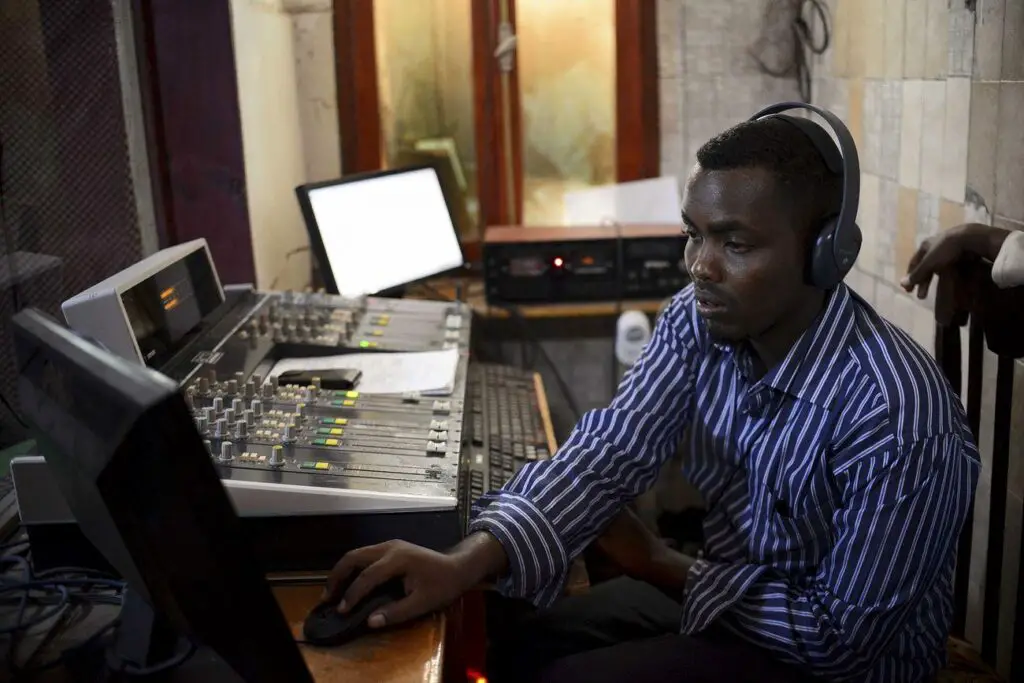Are you interested in a career in music production? Graduates with a music production degree have access to a wide range of job opportunities in the music industry, as well as in other related fields such as film, television, and advertising. In this article, we will explore the top high-paying jobs for music production degree holders, as well as provide insights on how to break into the music industry, salary expectations, essential skills, and more. Whether you’re a recent graduate or considering a career change, read on to discover how a music production degree can open doors to exciting job opportunities.
Table of Contents
Introduction
As the music industry continues to expand and evolve, there has been a growing demand for skilled music production graduates to fill various job positions. With so many potential career paths to choose from, it can be overwhelming to know where to start. In this article, we will be discussing the various job opportunities available to music production graduates, and provide insights on how to break into the industry. As a music production graduate, you possess a unique skill set that can help you stand out in a highly competitive job market. Whether you’re interested in audio engineering, music composition, sound design, or music production, this guide will provide you with valuable information to help you succeed in your career.

Overview of Music Production Careers
Music production is the process of creating and recording music, whether it’s in a studio or live setting. The music production industry is vast, offering various career paths that require a mix of technical skills, creativity, and collaboration. Some of the most common positions in music production include:
Audio Engineer
Audio engineers are responsible for recording and mixing audio tracks in a studio or live setting. They work closely with musicians, producers, and directors to ensure that the sound quality is top-notch. Audio engineers must have a keen ear for detail and be proficient in using various recording equipment.
Music Producer
Music producers manage the overall production process, including selecting songs, musicians, and recording techniques. They also work with audio engineers to ensure that the sound quality is up to par. Music producers must have excellent communication skills and be able to work well under pressure.
Sound Designer
Sound designers create and manipulate sound effects and music for films, television, and video games. They work closely with directors and producers to ensure that the sound matches the visuals. Sound designers must have a creative mind and be proficient in using various sound editing software.
Music Composer
Music composers write and produce original music for a variety of media, including film, television, and video games. They must be able to create music that evokes the desired emotions and feelings for the audience. Music composers must have extensive knowledge of music theory and be proficient in using various music composition software.
These are just a few of the roles that music production graduates can pursue. The music production industry is dynamic and exciting, with countless opportunities for graduates to find their niche and succeed in their careers.

Real-World Examples of Music Production Careers
To get a better sense of what a music production career can look like, let’s explore the career paths of a few successful music production graduates:
John Smith, Audio Engineer: After graduating with a music production degree, John Smith landed a job as an assistant audio engineer at a local recording studio. He worked his way up the ranks, eventually becoming the chief audio engineer and working with some of the biggest names in the music industry. Today, John runs his own recording studio and has won multiple awards for his work.
Samantha Lee, Music Composer: Samantha Lee always knew she wanted to work in the music industry, but wasn’t sure which career path to take. After getting her music production degree, she landed a job as a music composer for a major film studio. She has since worked on dozens of films and television shows, earning critical acclaim and multiple award nominations.
David Kim, Sound Designer: David Kim fell in love with sound design while studying music production in college. After graduation, he landed a job at a major video game company, where he has worked on some of the most popular video games of the past decade. He has won multiple awards for his innovative sound design work.
These are just a few examples of the many career paths available to music production graduates. With hard work and dedication, there are countless opportunities to succeed in the music industry and beyond.

Job Opportunities in the Music Industry
Graduates with a music production degree can explore a variety of job opportunities in the music industry. Below are some of the most popular music production jobs:
Audio Engineer
Audio engineers are responsible for recording and mixing audio tracks. They collaborate with artists and producers to ensure that the final product meets their vision. To succeed in this role, you need a strong understanding of audio technology, as well as excellent communication and collaboration skills. According to the Bureau of Labor Statistics, the median annual wage for audio and video equipment technicians was $48,490 in May 2020.
Music Producer
Music producers oversee the overall production process, from selecting songs and musicians to recording techniques and mixing. They work closely with artists to create a cohesive sound and ensure that the final product meets their vision. To succeed in this role, you need excellent communication and leadership skills, as well as a strong understanding of music theory and production techniques. According to Glassdoor, the average annual salary for a music producer is $49,000.
Sound Designer
Sound designers create and manipulate sound effects and music for a variety of media, including film, television, and video games. They collaborate with directors and producers to create a specific sound or mood for a particular scene or project. To succeed in this role, you need a strong understanding of audio technology and production techniques, as well as excellent creativity and problem-solving skills. According to the Bureau of Labor Statistics, the median annual wage for multimedia artists and animators, which includes sound designers, was $77,700 in May 2020.
Music Composer
Music composers write and produce original music for a variety of media, including film, television, and video games. They collaborate with directors and producers to create a specific sound or mood for a particular scene or project. To succeed in this role, you need a strong understanding of music theory and composition techniques, as well as excellent creativity and problem-solving skills. According to the Bureau of Labor Statistics, the median annual wage for musicians and singers, which includes music composers, was $31.35 per hour in May 2020.
Songwriter
Songwriters create lyrics and melodies for songs, often collaborating with other musicians and producers. They need excellent creativity and communication skills to succeed in this role, as well as a strong understanding of music theory and songwriting techniques. According to the Bureau of Labor Statistics, the median annual wage for writers and authors, which includes songwriters, was $67,120 in May 2020.
Music Teacher
Music teachers teach students of all ages and skill levels how to play an instrument or sing. They need excellent communication and teaching skills, as well as a strong understanding of music theory and performance techniques. According to the Bureau of Labor Statistics, the median annual wage for music directors and composers, which includes music teachers, was $52,510 in May 2020.
Music Therapist
Music therapists use music to help patients with a variety of mental and physical health issues. They need excellent communication and empathy skills, as well as a strong understanding of music theory and therapy techniques. According to the Bureau of Labor Statistics, the median annual wage for recreational therapists, which includes music therapists, was $50,830 in May 2020.
These careers require different skills and qualifications, but a music production degree provides graduates with the foundation they need to succeed in the music industry.

Music Production Degree Jobs Outside of the Music Industry
While there are many job opportunities in the music industry for music production graduates, there are also opportunities outside of the industry. Here are some potential job opportunities for music production graduates in other industries:
Film and Television
Film and television productions require original music and sound design. As a music production graduate, you have the skills and knowledge to create and produce music and sound effects for film and television. You can work as a music composer, sound designer, or audio engineer on various productions. Music composers create the score or soundtrack for films, television shows, and other productions. Sound designers are responsible for creating and recording sound effects, while audio engineers are responsible for recording and mixing audio.
Advertising
Advertising agencies use music to create a specific mood or tone for a commercial or promotional video. As a music production graduate, you can work as a music composer or sound designer to create original music and sound effects for various advertising campaigns. Music composers create jingles and original music for advertisements, while sound designers create and record sound effects that are used in commercials.
Gaming
The gaming industry is another great opportunity for music production graduates. Video games require music and sound effects to create an immersive experience for players. As a music production graduate, you can work as a music composer or sound designer to create original music and sound effects for various games. Music composers create the score or soundtrack for video games, while sound designers create and record sound effects that are used in games.
Radio
Radio stations require original music and sound effects for their programming. As a music production graduate, you can work as a music composer or sound designer to create original music and sound effects for various radio programs. Music composers create jingles and original music for radio advertisements and programs, while sound designers create and record sound effects that are used in radio programs.
Podcasts
Podcasts have become increasingly popular in recent years, and they also require music and sound effects to create an engaging and immersive experience for listeners. As a music production graduate, you can work as a music composer or sound designer to create original music and sound effects for various podcasts. Music composers create original music for the introduction and closing of podcasts, while sound designers create and record sound effects that are used during the podcast.
Overall, music production graduates have a wide range of job opportunities available to them outside of the music industry. By leveraging their skills and knowledge, they can find success in many different fields.
Tips for Breaking into the Music Industry with a Music Production Degree
Breaking into the music industry can be a challenging task, but it’s not impossible. Here are some tips that can help you get started:
1. Build a Strong Network
One of the most important things you can do to break into the music industry with a music production degree is to build a strong network. Attend industry events, join professional organizations, and connect with other professionals in the industry. Building a network can help you learn about job openings, connect with potential clients, and get your foot in the door.
2. Gain Hands-On Experience
Another way to increase your chances of success in the music industry is to gain hands-on experience. Interning at a music studio or production company can provide valuable experience and help you build your portfolio. You can also consider volunteering at a local community center or school to gain real-life experience.
3. Create a Strong Online Presence
In today’s digital age, having a strong online presence is crucial. Use social media and online platforms to showcase your work and connect with potential clients. Consider creating a professional website or portfolio to showcase your skills and work experience.
4. Be Persistent
Breaking into the music industry can take time, so it’s important to be persistent and keep working towards your goals. Stay motivated and continue to network, gain experience, and showcase your skills. Remember that every small step you take can bring you closer to your dream job.
Salary Expectations for Jobs with Music Production Degree
As with any career, the salary potential for music production jobs can vary depending on several factors such as location, experience, and education. It’s essential to research the potential salary range for a specific role in the industry before pursuing it. Here are some examples of the highest paid music production careers in the industry according to the Bureau of Labor Statistics (May 2020):
| Job Title | Median Annual Wage |
|---|---|
| Music Producer | $49,000 |
| Sound Designer | $77,700 |
| Music Composer | $31.35 per hour |
It’s important to note that the salary range can fluctuate depending on the type of employer as well. For example, music producers who work for independent record labels may earn less than those who work for major record labels. Additionally, music composers who work for video game companies may earn more than those who work for film and television production companies. Therefore, it’s vital to research the specific industry and employer to understand the potential salary range.
It’s also worth mentioning that freelancing is a common career path for music production professionals. Freelancers can set their own rates and work on a project-by-project basis, which can impact their earning potential. Some music producers and composers also earn royalties from their work, which can provide additional income.
Overall, pursuing a career in music production can be financially rewarding, but it’s essential to research the potential salary range and understand the factors that can impact earning potential.
Essential Skills for a Music Production Degree
To succeed in a music production career, you need to possess several essential skills, including:
Technical Skills
A strong understanding of audio technology and production techniques is essential for many music production careers. You should have a solid grasp of the technical aspects of sound design, audio editing, mixing, and mastering. Familiarity with Digital Audio Workstations (DAWs) is also crucial. You can develop these skills by taking courses or certifications in sound engineering, music production, or audio technology. You can also get hands-on experience by working on your own projects or collaborating with others.
Creativity
Music production is a creative field that requires originality and innovation. You should have a good sense of musicality and be able to come up with unique ideas for sound design, composition, and arrangement. You should also be able to adapt to different genres and styles of music. You can develop your creativity by listening to a wide range of music and experimenting with different techniques and tools. Collaborating with other artists and producers can also help you expand your creative horizons.
Collaboration
Collaborating with other professionals in the industry, such as artists and producers, requires excellent collaboration and communication skills. You should be able to work well in a team and be open to feedback and criticism. You should also be able to communicate your ideas clearly and effectively. Developing strong interpersonal skills can help you build relationships with industry professionals and advance your career. You can develop these skills by attending networking events, working on collaborative projects, or taking courses in communication and teamwork.
By developing and improving these essential skills, you can position yourself for success in the music production industry. Consider taking courses or attending workshops in your area of interest to enhance your skills and stay up-to-date with the latest trends and technologies.

Best Music Production Degree Programs
If you’re interested in pursuing a music production degree, there are several top programs in the United States. These programs are known for their comprehensive curricula, experienced faculty, and state-of-the-art facilities. Here are some of the best music production degree programs in the country:
Berklee College of Music
Berklee College of Music is one of the most prestigious music schools in the world. The college offers a Bachelor of Music in Music Production and Engineering program that prepares students for careers in music production, recording, and engineering. The program focuses on developing students’ technical skills, creativity, and critical thinking abilities through hands-on experience and classroom instruction. Students learn the fundamentals of music theory and production, as well as advanced techniques in sound design, mixing, and mastering.
Full Sail University
Full Sail University offers a Bachelor of Science in Music Production program that is designed to prepare students for careers in the music industry. The program focuses on developing students’ technical skills, creativity, and entrepreneurial spirit. Students learn the fundamentals of music production, as well as advanced techniques in sound design, mixing, and mastering. They also have access to state-of-the-art recording studios, sound stages, and post-production facilities.
University of Southern California
The University of Southern California offers two music production degree programs: Bachelor of Music in Popular Music Performance and Bachelor of Music in Screen Scoring. The popular music performance program is designed to prepare students for careers as performers, songwriters, and producers, while the screen scoring program focuses on preparing students for careers in film, television, and video game music. Both programs offer a comprehensive curriculum that includes courses in music theory, composition, and production. Students have access to world-class facilities and experienced faculty.
When choosing a program, consider factors such as accreditation, faculty, facilities, and program specialization. It’s important to research each program thoroughly and speak with current students and faculty members to determine which program is the best fit for your career goals and interests.
Job Outlook for Music Production Degree Graduates
Graduates with a music production degree can look forward to a positive job outlook, with projected growth in the music industry and related fields. However, the music industry is constantly evolving, and it’s crucial to stay up-to-date with industry trends and challenges. Some of the current challenges facing the music industry include digital piracy, streaming revenue, and competition from other forms of entertainment. In addition, the COVID-19 pandemic has also impacted the music industry, with live performances and concerts being canceled or postponed. However, with the rise in digital streaming platforms, there has been an increased demand for music production professionals to create new content. Therefore, it is important for graduates to be adaptable and versatile to meet changing demands of the industry. In order to increase their chances of finding a job, graduates should stay informed about emerging technologies and trends, network with industry professionals, and gain hands-on experience through internships or freelance projects.

Conclusion
Music production is a dynamic field that offers a wide range of career opportunities for graduates with a music production degree. With the skills and knowledge gained from their degree, graduates can pursue job opportunities in various industries, including film, television, and advertising. By leveraging their creativity and technical skills, they can succeed as audio engineers, music producers, sound designers, music composers, and more.
To break into the music industry, graduates should focus on building a strong network, gaining hands-on experience, and continuously developing their technical and creative skills. They can take advantage of various resources and tools available to them, including online courses, internships, and mentorship programs.
As the music industry continues to evolve, so do the career opportunities available to music production graduates. By staying updated on industry trends and advancements, graduates can stay at the forefront of their careers and achieve long-term success.
We hope this article has provided valuable insight into the various job opportunities available to music production graduates. Check out our other articles for more information on music production careers and job search strategies.
Frequently Asked Questions
Question: Who hires music production degree holders?
Answer: Music studios, film and TV production companies, and advertising agencies.
Question: What jobs can I get with a music production degree?
Answer: Audio engineer, music producer, sound designer, music composer, and more.
Question: How much can I earn with a music production degree?
Answer: Salaries vary by job and location, but music producers can earn an average of $49,000 per year.
Question: Who should get a music production degree?
Answer: Those interested in music, audio, and technology who want to work in the music industry.
Question: What skills do I need for a music production job?
Answer: Technical skills in audio and production, creativity, collaboration, and communication skills.
Question: How can I break into the music industry with a music production degree?
Answer: Build a network, gain hands-on experience, create an online presence, and be persistent.


